

Capitalism. Bruce Judson: Restoring Capitalism: The Kids Camping on Wall Street Are the Capitalists. Today, some of the leading capitalists in the nation are located on Wall Street.

Sadly, it is the protesters outside who are literally on the street who embody the ideal rewards and responsibilities of capitalism, not the financiers who occupy the buildings. Jeff Miron on Capitalism. Americatowns Abroad: One Bleak Vision Of American Workers' Future. As Wall Street bandies about the odds of another recession, American workers have bigger worries than fluctuations in GDP: The economy just doesn't seem to be working for them anymore.

With globalization and technological advances allowing US companies to grow while shedding labor and shifting it overseas, even times of recovery aren't providing new jobs or wage growth. Things are bad enough in sectors like manufacturing, which has lost a third of its domestic jobs in a decade. But, as Don Peck writes in next month's Atlantic magazine, we haven't even really started to feel the effects of technology-driven efficiency on middle-income white-collar fields like information technology: Computer software can now do boilerplate legal work, for instance, and make a first pass at reading X-rays and other medical scans. America's economic refugees could open franchises of fast-food joints and restaurants serving American cuisine abroad, Giridhadas muses. Karl Smith: Capital vs. Labor.
Karl Smith makes a good point: Capital vs.

Labor, by Karl Smith: Catherine Rampell is exploring a thesis about the hiring practices. A sample On Friday, I wrote about how equipment and software prices are getting rapidly cheaper while the cost of labor has been getting more expensive, making capital a more attractive investment to companies than people. Tax incentives that encourage earlier capital investment may be helping, too. Importantly this only makes sense if capital and labor are substitutes in production. The Ideological Crisis of Western Capitalism. Just a few years ago, a powerful ideology – the belief in free and unfettered markets – brought the world to the brink of ruin.
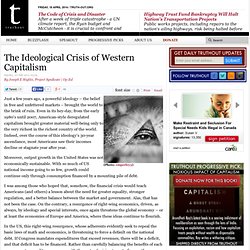
Even in its hey-day, from the early 1980’s until 2007, American-style deregulated capitalism brought greater material well-being only to the very richest in the richest country of the world. Indeed, over the course of this ideology’s 30-year ascendance, most Americans saw their incomes decline or stagnate year after year. Moreover, output growth in the United States was not economically sustainable. With so much of US national income going to so few, growth could continue only through consumption financed by a mounting pile of debt. Rule by Rentiers. Nor is the Federal Reserve riding to the rescue.
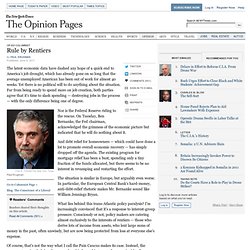
On Tuesday, Ben Bernanke, the Fed chairman, acknowledged the grimness of the economic picture but indicated that he will do nothing about it. And debt relief for homeowners — which could have done a lot to promote overall economic recovery — has simply dropped off the agenda. The existing program for mortgage relief has been a bust, spending only a tiny fraction of the funds allocated, but there seems to be no interest in revamping and restarting the effort. The situation is similar in Europe, but arguably even worse. In particular, the European Central Bank’s hard-money, anti-debt-relief rhetoric makes Mr. What lies behind this trans-Atlantic policy paralysis? Capitalism's Dismal Future - The Chronicle Review. By Paul Mattick Apart from the patently nonreality-based dissent of its Republican members, the Financial Crisis Inquiry Commission could hardly have expected the report it issued in January to arouse much excitement.

After a year and a half of research and the testimony of academics and other economic experts, it came up with no more than the already conventional wisdom that the economic downturn that burst into public view in 2007 might have been avoided, having been caused by a combination of lax governmental regulation and excessive risk-taking by lenders and borrowers, particularly in the housing market. The same conventional wisdom assures us that swift government action prevented the Great Recession from turning into a full-blown depression, and that the downturn has given way to recovery, albeit a "fragile" one. No matter how often it is repeated, however, this wisdom remains unconvincing. The Ideological Crisis of Western Capitalism - Joseph E. Stiglitz. Exit from comment view mode.
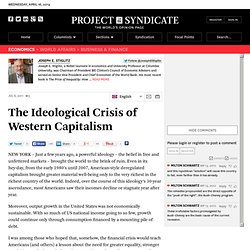
Click to hide this space. On Short-Termism and the Institutionalization of Rentier Capitalism. Andrew Haldane and Richard Davies of the Bank of England have released a very useful new paper on short-termism in the investment arena.
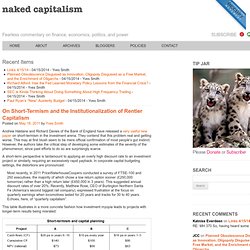
They contend that this problem real and getting worse. This may at first blush seem to be mere official confirmation of most people’s gut instinct. Has Managerial Capitalism Peaked? Summing Up The clear consensus of those responding to this month's column is that managerial capitalism, as John Bogle terms it, has peaked.
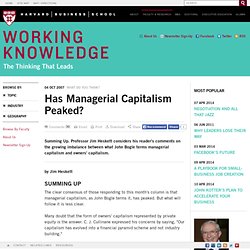
But what will follow it is less clear. Many doubt that the form of owners' capitalism represented by private equity is the answer. C. J. One piece of evidence that something is wrong with managerial capitalism was presented by B. Capitalists Who Make vs. Capitalists Who Take. What’s the difference between productive wealth and destructive wealth?
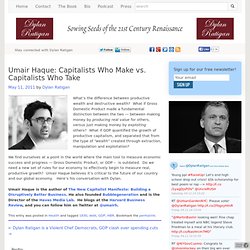
What if Gross Domestic Product made a fundamental distinction between the two — between making money by producing real value for others, versus just making money by exploiting others? What if GDP quantified the growth of productive capitalism, and separated that from the type of “wealth” created through extraction, manipulation and exploitation? We find ourselves at a point in the world where the main tool to measure economic success and progress — Gross Domestic Product, or GDP – is outdated. Do we need a new set of rules for our economy to effectively begin to measure real, productive growth? Umair Haque believes it’s critical to the future of our country and our global economy. Global capitalism and 21st century fascism. Story highlights The crisis of global capitalism is unprecedented, given its magnitude, its global reach, the extent of ecological degradation and social deterioration, and the scale of the means of violence. We truly face a crisis of humanity.
The stakes have never been higher; our very survival is at risk. We have entered into a period of great upheavals and uncertainties, of momentous changes, fraught with dangers - if also opportunities. Michel Bauwens Interviewed by Furtherfield. Excerpted from an interview conducted for Furtherfield, by Lawrence Bird on 17/12/2010 It’s a commonplace now that the peer-to-peer movement opens up new ways of creating relating to others. P2P Foundation. Lewis Lapham on "the end of capitalism" - War Room. The Alternative to Capitalism. Adam Buick If state capitalism is not socialism, what is ? In other words, if state ownership and management of production does not amount to the abolition of capitalism but only to a change in the institutional framework within which it operates, what would be the essential features of a society in which capitalism had been abolished?
Although it is possible to imagine that capitalism could be replaced by some new form of class society in which some other method of exploitation would replace the wages system, we shall concern ourselves here only with the replacement of capitalism by a society from which, to remain deliberately vague for the moment, exploitation and privilege would be absent. Since capitalism isa worldwide class society and exchange economy, it is clear that the exploitation-less alternative to capitalism would have to be a classless world society without exchange.
Guest Post: Capitalism, Socialism or Fascism? By George Washington of Washington’s Blog. What is the current American economy: capitalism, socialism or fascism? Socialism Initially, it is important to note that it is not just people on the streets who are calling the Bush and Obama administration’s approach to the economic crisis “socialism”. Economists and financial experts say the same thing. For example, Nouriel Roubini writes in a recent essay: